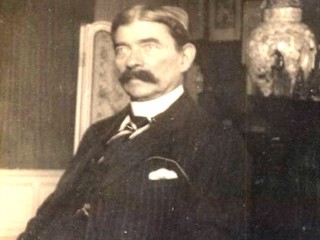
Frank Harris biography
Date of birth : 1856-02-14
Date of death : 1931-08-27
Birthplace : Galway, Ireland
Nationality : Irish-American
Category : Famous Figures
Last modified : 2011-04-27
Credited as : Author, and editor, Saturday Review
The writings of the Irish-American author and editor Frank Harris (1856-1931) ranged from the scandalous to the distinguished.
Frank Harris was born on Feb. 14, 1856, in Galway, Ireland. A small, ugly, passionate boy with a quick mind, he won a scholarship to Cambridge University but took the prize of £10, and ran off to the United States. His odd jobs in New York, Chicago, and Texas are recounted with dubious accuracy in On the Trail: Being My Reminiscences as a Cowboy (1930).
At the University of Kansas, Harris mixed law studies with precocious sensuality, became an American citizen, and attained admission to the bar. His decision to leave for England and then to write as a correspondent in the Russo-Turkish War reflected his stormy, ambitious disposition. He subsequently studied at German universities and sought out distinguished contemporaries, whom he tried to impress with his reading, rich voice, and eloquent pronouncements.
In the early 1880s Harris became editor of the London Evening News. Absorbed in "kissing and fighting, " he also sought fame. He became editor of the Fortnightly and married for money but soon abandoned the review. He then purchased his most notable publication, the London-based Saturday Review, drawing such new talents as Bernard Shaw and H. G. Wells to it.
Harris stirred interest. Thomas Carlyle saw him as earnest and idealistic. George Meredith admired his writing. But A. E. Housman resented his "truculent praise, " and Joseph Conrad found him unimpressive. A raconteur, Harris fascinated some; others, aware of his shady business intrigues and undiscriminating amorous adventures, resented or even despised him. However, his friendship with Oscar Wilde and his generosity toward needy writers appear to have been genuine.
In 1898 Harris sold the Saturday Review. Subsequent editorships included Vanity Fair (1907-1910), Hearth and Home (1911-1912), and Modern Society (1912-1913). All were downhill operations, the last occasioning a prison term for libel.
Harris's own writing included Elder Conklin (1894), a group of naturalistic tales that impressed critics. Montes, the Matador (1900) increased his prestige. The Man Shakespeare (1909) and The Women of Shakespeare (1911) were praised as fresh and penetrating. Contemporary Portraits (1915), the first of five volumes, attempted to make art out of Harris's friendships and contacts. Oscar Wilde (1916) was hailed by some critics as a masterpiece in both its human perceptions and its literary style.
Back in the United States Harris bought and edited Pearson's Magazine, which was harassed by the U.S. Post Office for its pro-Germanism and eventually suspended. Having remarried, he and his second wife returned to France. Here he wrote his most sensational book, My Life and Loves, which was circulated from under booksellers' counters. Bernard Shaw (1931), published posthumously, was largely prepared by others.
















